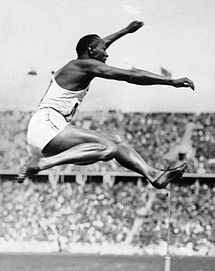Owens's greatest achievement came in a span of 45 minutes on May 25, 1935, during the Big Ten meet at Ferry Field in Ann Arbor, Michigan, where he set three world records and tied a fourth. He equaled the world record for the 100 yard dash (9.4 seconds); and set world records in the long jump (26 ft 81⁄4 in or 8.13 m, a world record that would last 25 years); 220-yard (201.2 m) sprint (20.3 seconds); and 220-yard (201.2m) low hurdles (22.6 seconds, becoming the first to break 23 seconds).[4] In 2005, University of Central Florida professor of sports history Richard C. Crepeau chose these wins on one day as the most impressive athletic achievement since 1850.[9]
Berlin Olympics[edit]
In 1936, Owens arrived in Berlin to compete for the United States at the Summer Olympics. Adolf Hitler was using the games to show the world a resurgent Nazi Germany.[10] He and other government officials had high hopes that German athletes would dominate the games with victories. Meanwhile, Nazi propaganda promoted concepts of "Aryan racial superiority" and depicted ethnic Africans as inferior.[10][11] Owens countered this by winning four gold medals.
On August 3, he won the 100m sprint with a time of 10.3s, defeating teammate college friend[1] Ralph Metcalfe by a tenth of a second and defeating Tinus Osendarp of the Netherlands by two tenths of a second. On August 4, he won the long jump with a leap of 26 ft 5 in (later crediting his achievement to the technical advice he received from Luz Long, the German competitor whom he defeated).[4] On August 5, he won the 200m sprint with a time of 20.7s, defeating Mack Robinson (the older brother of Jackie Robinson). On August 9, Owens won his fourth gold medal in the 4x100 sprint relay when coach Dean Cromwell replaced Jewish-American sprinters Marty Glickmanand Sam Stoller with Owens and Ralph Metcalfe, who teamed with Frank Wykoff and Foy Draper to set a world record of 39.8s in the event.[12] This performance was not equaled until Carl Lewis won gold medals in the same events at the Soviet-boycotted 1984 Summer Olympics in Los Angeles. In 1935 (the year before the Berlin Olympics), Jesse Owens set the world record in the long jump with a leap of 26 ft 8 in, and this record would stand for 25 years (a very rare length of time for a track and field record), until it was finally broken by Ralph Boston in 1960. Coincidentally, Owens was a spectator at the 1960 Summer Olympics in Rome when Boston took the gold medal in the long jump.
Just before the competitions, Owens was visited in the Olympic village by Adi Dassler, the founder of the Adidas athletic shoe company. He persuaded Owens to use Gebrüder Dassler Schuhfabrik shoes, the first sponsorship for a male African-American athlete.[13]
The long-jump victory is documented, along with many other 1936 events, in the 1938 film Olympia by Leni Riefenstahl.
On the first day of competition, Hitler shook hands only with the German victors and then left the stadium. Olympic committee officials insisted Hitler greet every medalist or none at all. Hitler opted for the latter and skipped all further medal presentations.[14][15] Historians have noted that Hitler may have left the games at this time due to looming rain clouds which may have postponed the games. This happened well before Owens was to compete, but has largely come to be believed to be the "snub".[16] On reports that Hitler had deliberately avoided acknowledging his victories, and had refused to shake his hand, Owens said at the time:

No comments:
Post a Comment